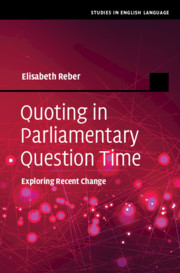Book contents
- Quoting in Parliamentary Question Time
- Studies In English Language
- Quoting in Parliamentary Question Time
- Copyright page
- Contents
- Figures
- Tables
- Acknowledgements
- Abbreviations
- Chapter 1 Introduction
- Chapter 2 Reported Speech and Evidentiality
- Chapter 3 Prime Minister’s Questions
- Chapter 4 Data, Transcription, and Methodology
- Chapter 5 Reporting Clauses
- Chapter 6 Reported Clauses
- Chapter 7 Reported Speech and Rhetorical Structures
- Chapter 8 Reported Speech in Recurrent Courses of Action
- Chapter 9 Summary and Conclusions
- Book part
- References
- Index
Chapter 4 - Data, Transcription, and Methodology
Published online by Cambridge University Press: 27 August 2021
- Quoting in Parliamentary Question Time
- Studies In English Language
- Quoting in Parliamentary Question Time
- Copyright page
- Contents
- Figures
- Tables
- Acknowledgements
- Abbreviations
- Chapter 1 Introduction
- Chapter 2 Reported Speech and Evidentiality
- Chapter 3 Prime Minister’s Questions
- Chapter 4 Data, Transcription, and Methodology
- Chapter 5 Reporting Clauses
- Chapter 6 Reported Clauses
- Chapter 7 Reported Speech and Rhetorical Structures
- Chapter 8 Reported Speech in Recurrent Courses of Action
- Chapter 9 Summary and Conclusions
- Book part
- References
- Index
Summary
Chapter 4 describes the composition of the self-compiled data base for the study, which consists of two comparable data sets of authentic recordings of Prime Minister’s Questions (PMQs) from 1978–1988 (audio) and 2003–2013 (video) as well of the respective Hansard files. It outlines how the language-external processes which have changed the interaction at PMQs between 1978–2013 provide the backdrop against which the evolution of reported speech is analysed. Specifically, it is argued that the composition of participation in the activity at PMQs has changed in correlation with the more prominent role of the Leader of the Opposition, and fostered a sharp increase of reported speech. It is demonstrated how the calculation of frequencies is conducted in relation to turn types and speaker roles. The chapter finally presents the transcription conventions and procedure, and discusses the basic methodological assumptions of the study.
Keywords
- Type
- Chapter
- Information
- Quoting in Parliamentary Question TimeExploring Recent Change, pp. 38 - 52Publisher: Cambridge University PressPrint publication year: 2021

